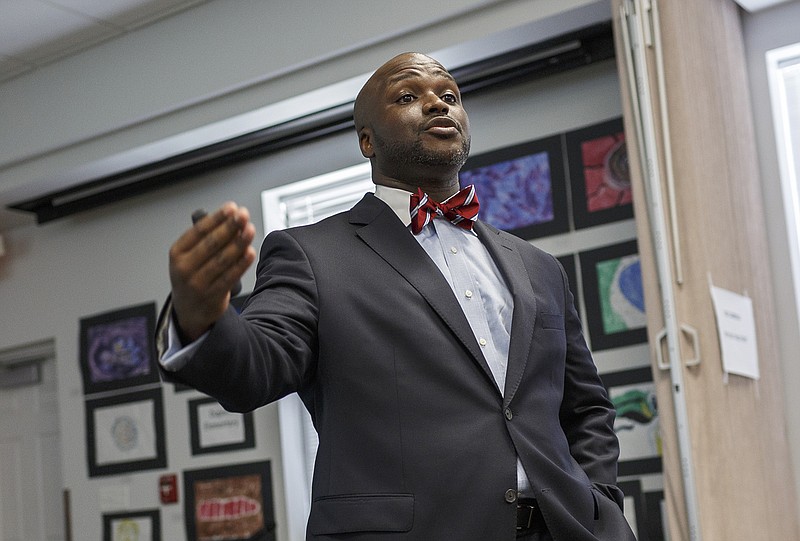Bryan Johnson is enthusiastic about jumping into his new role as Hamilton County Schools superintendent and the work ahead.
"There is absolutely no reason a city that has the vibrancy that Chattanooga has should not have a world-class school system," Johnson said Friday morning. "We're just prime for that and ready for the take-off."
The Hamilton County Board of Education chose Johnson, an energetic Tennessee educator, to the district's top post Thursday night.
Though the vote split 5-4, board members unanimously accepted the formal recommendation to name him superintendent and start negotiating a contract of up to four years.
Johnson said he hopes those negotiations will be finished soon, as he's eager to start working here.
"Every day is critical right now," he said.
Johnson, 34, and his wife, Candy, have two children who will be turning 6 and 16 in coming weeks. The decision to apply for the job here was made by the entire family, he said.
Throughout his career, Johnson said, it's been important to him that his kids attend public schools, and they'll both be enrolling in Hamilton County Schools this fall.
"If [a school] is not good enough for my children, it's not good enough for any student in Hamilton County," he said.
For the last decade, Johnson has worked in Clarksville-Montgomery County Schools, the seventh-largest Tennessee school district, located north of Nashville. He started his career teaching and coaching in the school system and was promoted through the ranks and named chief academic officer in 2015.
Over the past four years, Clarksville-Montgomery County Schools have posted strong academic growth, according to state standardized tests. And four of the district's eight high schools were named in the U.S. News Best High Schools list this year.
Johnson commended the work of Hamilton County Schools Interim Superintendent Kirk Kelly, who received four votes for the permanent position. Johnson said Friday that Kelly did a fantastic job leading the district and he hopes Kelly will be a resource about the district and the work underway.
School board chairman Steve Highlander said Friday he's optimistic about the future of Hamilton County Schools with Johnson at the helm.
"I very much appreciate the work Dr. Kelly and his staff have done," Highlander said. "I hope Dr. Johnson can take the good things that have come from them and expand and build on it."
***
Johnson said he's already mapped out his first 100 days, and the plan includes:
- Immediately establishing a transition team and working closely with the school board, district administrators and educators to learn firsthand about the challenges facing the district and what is working;
- Meeting with people in different sectors of the community to hear how they perceive the district and what they want moving forward;
- Working with the Hamilton County Commission and mayor to understand what kind of a plan they want to see and invest in;
- Focusing on the district's lowest-performing schools.
"The community will see a highly visible superintendent, a very present superintendent that is always asking questions," Johnson said. "And the purpose of asking those questions is to help solidify a plan that will help move our schools forward."
Johnson said he hopes to strengthen the district's strategic plan, and weave the work being done by education stakeholders such as Chattanooga 2.0, UnifiEd, the Chattanooga Area Chamber of Commerce and the Public Education Foundation into it. The strategic plan also will be aligned to specific outcomes and metrics, he added.
There are many accountability measures for academics, Johnson said, but he wants the district also to set metrics around everything from facilities to operations to teacher recruitment and retention. All of these things must be included in the strategic plan, he added, and the budget needs to be built around that plan and its goals.
Without metrics in place, the district will be basing its work on feelings and not facts, Johnson said. By providing a clear vision and proof-points to the community and county commission, he hopes to generate support for increased funding.
"I've really got to get in the trenches with those commissioners and hear what they say are concerns and where they see the future of our system," Johnson said.
The county needs to be committed to financially supporting the school system, Johnson said, but the schools must offer a strong strategic plan and be transparent about whether it is meeting the goals it sets.
"There has got to be give-and-take and open dialogue," Johnson said, adding that the many great things taking place in the district also need to be highlighted.
Hamilton County Mayor Jim Coppinger sent a letter to Highlander last week asking that the school board and commission work together, once a permanent superintendent is in place, to improve community perceptions and increase funding for schools.
Sabrena Smedley, chairwoman of the county commission's education committee, said she's hopeful the the commission will work with Johnson and the school board to make county schools excellent. Smedley hopes the groups will start working together in coming months to develop a vision and a more proactive approach to addressing maintenance and facility needs.
"I'm looking forward to having some serious conversations," she said. " I want to see some plans put in place."
Johnson said his first 100 days will feature a "laser focus" on the district's five lowest-performing schools, known as priority or iZone schools.
The state Department of Education has told Hamilton County Schools it either needs to partner with the state to improve iZone schools or see them placed in the state-run Achievement School District.
Johnson said he wants to peel back the layers of the state's plan for the partnership district, and hear what the community thinks those schools need to be successful.
Tennessee Education Commissioner Candice McQueen said she looks forward to working with Johnson to boost student success, and she plans to bring him up to speed soon on the conversations between the state and the district about the iZone schools.
"We welcome his feedback and ideas about school improvement," McQueen added.
Hamilton County Schools' problems didn't develop overnight, Johnson said, and many of them are external to the school system. That means they can't be expected to change immediately.
But as superintendent, Johnson said, it's his responsibility to ensure all students have what they need to be successful. The district must work with urgency, he said, and can't wait five years to start posting gains.
"Five years for some kids is going to be too late," he said. " We need to start changing things tomorrow. No, we need to be changing things today."
Contact staff writer Kendi A. Rainwater at krainwater@timesfreepress.com or 423-757-6592. Follow on Twitter @kendi_and.
By the numbers:
Clarksville-Montgomery County SchoolsSize: 32,605 students, 2,047 teachers and 39 schoolsDemographics: 54.8 percent of students are white, 28.4 percent live in poverty.Graduation rate: 94.8 percentPer-student spending: $8,756Academics: The district received the top score, as rated by the state, for academic growth in three of the last four years; its average ACT score is 20.Hamilton County SchoolsSize: 44,414 students, 3,223 teachers and 79 schoolsDemographics: 55.9 percent of students are white, 35.7 percent live in povertyGraduation rate: 83.8 percentPer-student spending: $9,728Academics: The district has received low marks during the past three years, as rated by the state, for academic growth; its average ACT score is 19.8.Source: Tennessee Department of Education

